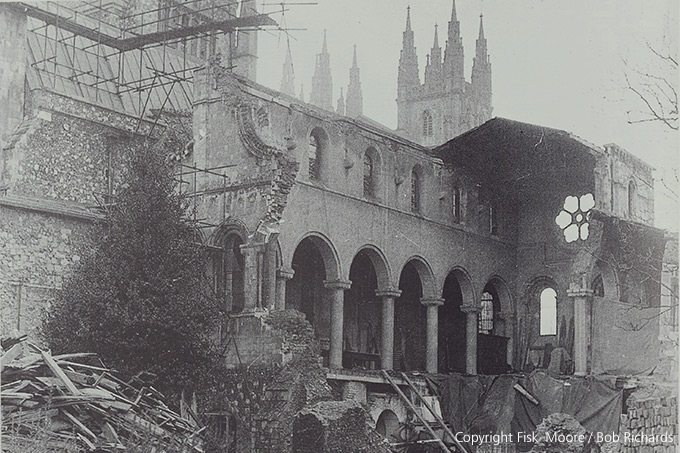On the 75th anniversary of the first of the Baedeker raids on Canterbury, Dr Martin Watts, Lecturer in Modern History, and Jordan Newton, a third-year Modern History student, look back at the attack on the City.
Today, 75 years ago, the German Luftwaffe attacked the City during the early hours. Canterbury was not the only historical city to be targeted, others included Exeter, York, Bath and Norwich.
What makes these raids significant is not only the casualties and physical damage caused by the bombing itself, but by the way in which the target cities were selected for bombing by the German high command. Conceived as an act of revenge for the RAF’s heavy bombing of Lubeck, Rostock and Cologne, the latter being carried out on the 30th May 1942 with the destruction of around 85% of the city, the Baedeker raids represented an escalation in the air war between Britain and Germany. This escalation, on the part of Germany, included the widening of targets from purely military and logistical objectives to those with significant cultural and historical importance. Hitler was adamant that the destruction of the German cities in the first six months of 1942 when, under its new C in C, Air Marshal Sir Arthur Harris, RAF Bomber Command began an intensive bombing campaign, be avenged by attacking civilian morale in Britain through these cultural targets. As a basis for selection, the 1937 Baedeker guide for German tourists was used by the Luftwaffe to pick out the most highly rated cities that embodied British cultural history, hence the title given to the raids.
As a result of the raid on Canterbury on June 1st, 43 people lost their lives and nearly 100 were wounded. The physical damage to the city included 800 buildings that were completely destroyed with 1000 seriously damaged and 5000 suffering minor damage only. Thanks to the efforts of the emergency services and the many civilian volunteers in tackling the vast number of incendiaries that were dropped, damage to the Cathedral was restricted to the loss of the library. After the shock of the raid, the people of Canterbury stood defiantly alongside the surviving, symbolic structure of the Cathedral, demonstrating that Hitler’s attempt to break civilian morale in the city was no more than a futile gesture.
The combination of the new RAF offensive and the revenge bombing undertaken by the Luftwaffe represented a deliberate attempt to win the war by the undermining of civilian morale, bringing home to both populations the true meaning of total war. In this sense, the Canterbury raid signified the life and death struggle that enveloped Europe in the Second World War, the involvement of civilians and the pursuit of victory at any cost.
This expert comment piece was written by Dr Martin Watts, Lecturer in Modern History, and Jordan Newton, a third-year Modern History student. Canterbury Christ Church University’s Centre for Kent History & Heritage will be commemorating the Baedeker Raids with a half-day conference and city walk on Saturday 3 June 2017. For more information visit: https://www.canterbury.ac.uk/arts-and-humanities/events/arts-and-humanities/ckhh/the-baedeker-raid-on-canterbury-75-years-on.aspx.
 Expert comment
Expert comment holly finch
holly finch 1524
1524


